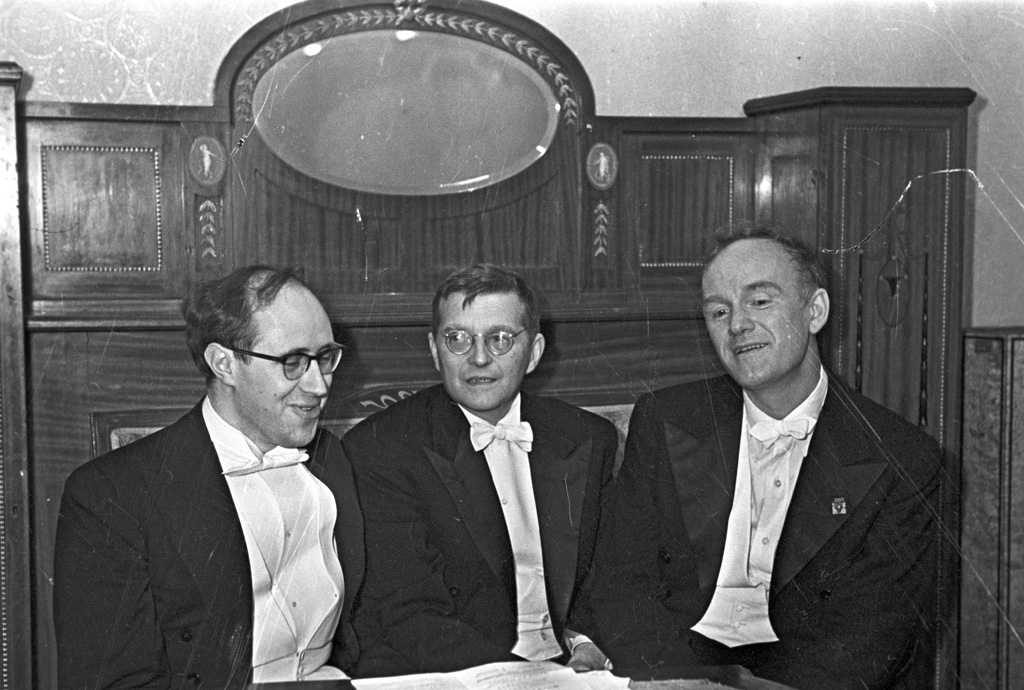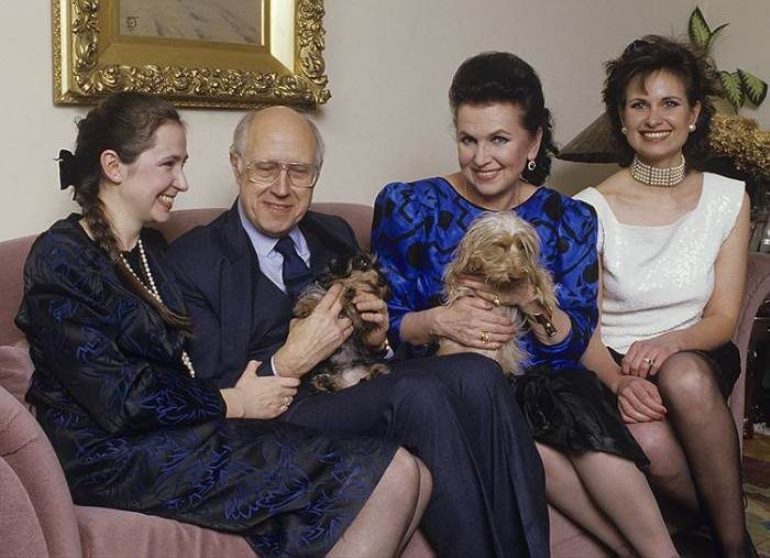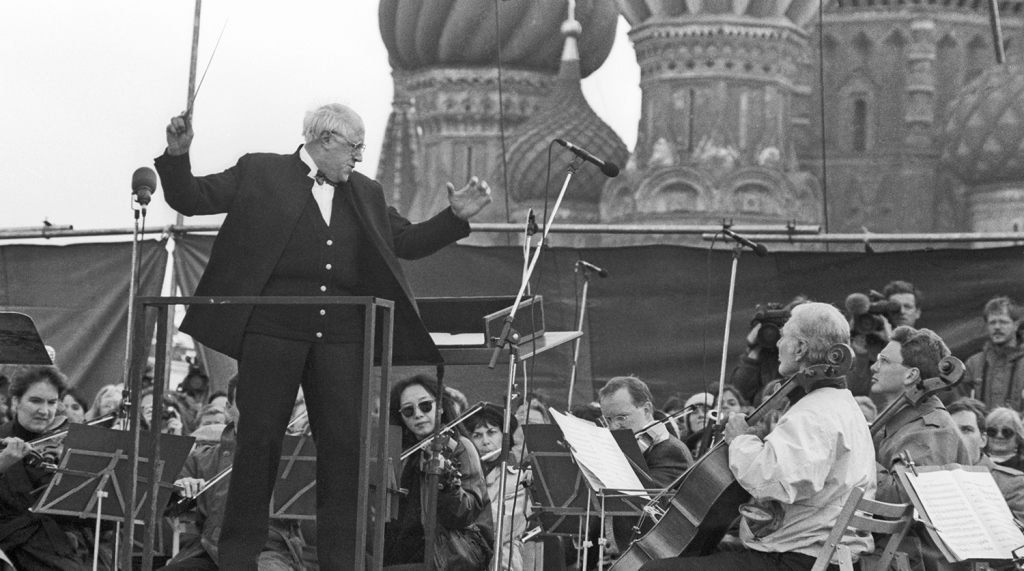
Mstislav Rostropovich: “Music is the instrument to make our planet one family”
/ Главная / Russkiy Mir Foundation / Publications / Mstislav Rostropovich: “Music is the instrument to make our planet one family”Mstislav Rostropovich: “Music is the instrument to make our planet one family”

Destined to be a musician
Rostropovich was not born in the capital. It was Baku where he drew his first breath on March 27, 1927. His mother, Sofiya Fedotova, was a pianist and one of the two daughters of Nikolai Fedotov, the founder of the Orenburg Conservatory. His father, Leopold Rostropovich, was a brilliant cello player and a professor at the local Conservatory. Their marriage blended Polish, Russian, Lithuanian, and German blood.
Taking into account such a family background, it should come as no surprise that Slava was introduced to playing piano and cello when he was four. At the age of 13, he performed with an orchestra. He entered the Moscow Conservatory when he was 16 years old. In 1945, a few months before his graduation, he won the gold medal at the Third All-Union Piano Competition in Moscow. Besides the 18-year-old Rostropovich, the first prize at the pianists' competition was awarded to Sviatoslav Richter who was 12 years older. This victory was the commencement of a remarkable career for the young cello player that continued for half a century. The Iron Curtain was also unable to stop the musician: his talent was so great that he turned into some sort of national currency, just like the Bolshoi Ballet and Soviet ice hockey. At the time, Rostropovich performed as a soloist with Richter and Oistrakh, under the baton of the great conductors Karajan and Ormandy. He was also honored with awards in Prague and Amsterdam.

People's Artists of the USSR Mstislav Rostropovich, Dmitri Shostakovich, and Sviatoslav Richter, 1968
The gift to turn people’s heads
Rostropovich's talent was about his demeanor and temperament both in communication and music. There were many those who fell in love with his distinctive speech (he used to pronounce "r's" in the French manner), elegant jokes, and gracious manners. All of the above came together to form his one-of-a-kind charisma.
I recall being one of the journalists who crowded backstage at the Great Hall of the Moscow Conservatory. I was standing in the queue waiting for Mstislav Leopoldovich to say a few words for an interview. The queue advanced rather quickly. Rostropovich poured forth with graphic remarks and posed with Yuri Bashmet and a couple of young female violinists. There was a relaxed atmosphere, and the maestros were joking. Suddenly a loud and clear voice was heard from the corridor, "Slava!" He promptly apologized to everyone there and left for his wife. The crowd gave a sad sigh. Bashmet made a helpless gesture with his hands and took on the task of talking to onrushing journalists.

Mstislav Rostropovich and Galina Vishnevskaya with their daughters Olga and Elena
It appears that Galina Vishnevskaya was the only person Mstislav Leopoldovich was unable to resist. Vishnevskaya was not only an outstanding singer but also a person with extraordinary charisma and, obviously, a very beautiful woman. In the early 1950s, Rostropovich visited the Prague International Music Festival as a guest. He met the diva of the Bolshoi Theater there. It was love at first sight. The marriage of the two classical music stars was crucial not only for their future personal and professional lives but also for Soviet music as a whole. The couple of Rostropovich and Vishnevskaya became a kind of common name in terms of representatives of Soviet or Russian classical music. Rostropovich often accompanied his wife on the piano during her recitals. His piano playing was breathtaking as well. As the years went by, Rostropovich committed himself to conducting and he also excelled in that endeavor. One of his favorite performances was the legendary Eugene Onegin by Bolshoi Theatre where his Vishnevskaya sang the part of Tatiana.

Rostropovich conducting in Red Square
In the meantime, Rostropovich and Vishnevskaya's relations with the Soviet authorities became rather complicated. In1972 he and his wife were restricted to travel abroad after the letter in support of the writer Solzhenitsyn. Later on, they were granted permission to travel at the request of U.S. Senator Edward Kennedy. Thus, the couple went abroad for the long 16 years. In 1978, they were stripped of their nationality. However, it was restored in 1990. And literally the next year, Mstislav Leopoldovich already sided with Russian President Boris Yeltsin. In August 1991, he was one of the defenders of the parliament building.
Source of inspiration
Rostropovich was just over twenty when the great Sergei Prokofiev wrote for him Symphony-Concerto for cello and orchestra. "It was a kind of emotional shock... Rostropovich, tall and rail-thin, came dramatically onto the stage holding out his cello like a victorious holy banner. Elegant Richter was behind him with a proud posture of his head featuring a large forehead... I found the stage performance surprisingly vivid: the way Rostropovich was sitting down on his chair with a mysterious expression on his face, the way he embraced his cello with passion, the way he started playing with expression, devotion, and love for every sound," recalled Tamara Grum-Grzhimaĭlo in her book Slava and Galina: Symphony of Life.
Some years later Shostakovich dedicated his Cello Concerto No. 1 to him. Rostropovich used to inspire composers with his two gifts: the exceptional skills of profound interpretation and passion for the popularization of contemporary music. Subsequently, such composers as Britten, Khachaturian, and Schnittke also dedicated their works to Rostropovich. The musician was the first interpreter of 135 works as a cello player and 87 as a conductor.
“ When my contact with composers starts, I sometimes cannot sleep nights,” the musician said in the interview. “This is because when I play his composition, he tells me, “Slava, you know, I think that this episode would be better a little bit faster, and another episode would be better if you play a little bit slower.” I don’t sleep because I think to myself, “Why had I not, through the music, understood this before?” For me, that’s what composer means there and that’s the most important goal, the most important idea.”
A remarkable thing happened to Rostropovich in Buenos Aires. An unknown composer came up to him and said: "You touched my heart, and I composed something for you." It was Grand Tango for cello and piano, and the composer was... Astor Piazzolla.
Back then Rostropovich was extremely busy and forgot about that proposal. He was reminded of it many years later when he returned to Buenos Aires with the National Symphony Orchestra. Here is how the musician himself describes it, “I was in the car which had stopped for a red traffic light. All kinds of small children came up to the car and asked for a little bit of beef to eat. They were beautiful, small children! After my concert, the sponsors give me such a dinner! I never had such dinner in my life! There was a mountain of the best caviar from Russia, fantastic! But after it, I left thinking about these small children. I told some friends that two years later I would be coming for a recital in the Teatro Colon. I asked them to help organize this. I would not take money for this concert, but I asked that they take the money and give it to children who ask for food. So I came and made my recital, and in this recital, as the last piece, I played that Tango of Piazzolla. I changed the cello part a little bit and asked him if he approved, and he was delighted. I also apologized that I had not played his beautiful piece many years ago. But after that concert, we had much money for the children!”
Man of the world
When perestroika started, Rostropovich was invited to come back to his homeland. He and Vishnevskaya visited Russia more frequently, although they had a busy schedule of touring throughout Europe, Japan, South America, and North America.
As to Russia, Rostropovich and Vishnevskaya arranged festivals, supported talents, and established charitable foundations to help sick children. Today their daughters continue their work. Olga heads the Young Musicians Fund and the Galina Vishnevskaya Opera Center, while Elena manages the Rostropovich-Vishnevskaya Foundation, the international medical foundation engaged in vaccination of children all over the world.
“What is the purpose of music?” Rostropovich was aked once. “Purpose??? There’s no purpose,” he answered. “It’s one of the greatest gifts for us from God. That’s God’s gift to us, one language for all lands with no need for a translator. I have difficulties explaining my ideas in English, but when I conduct or play, it is so easy to explain what I feel to the public for whom I perform. I come to practically the whole world, but that’s not important. Maybe there’s some audience which is not very educated in some way, far away from cities and arts centers, but in any case, people understand this message perfectly. Of course, with modern music, especially abstract music, it’s more difficult to understand, but music from geniuses is universal. For example, take Shostakovich. When I perform his Tenth Symphony, you see how emotional the public is. They understand this music. Yes, I think that music is the instrument in our life, in our land, to make our planet one family.”
The excerpts from an interview with Bruce Duffie, a writer, and journalist, were used in the article.
New publications

 Mikhail Kalatozov, a director who transformed the world of cinematography in many ways, was born 120 years ago. He was a Soviet film official and a propagandist. Above all, he was capable of producing movies that struck viewers with their power and poetic language.
Mikhail Kalatozov, a director who transformed the world of cinematography in many ways, was born 120 years ago. He was a Soviet film official and a propagandist. Above all, he was capable of producing movies that struck viewers with their power and poetic language.  Ukrainian authorities have launched a persecution campaign against the canonical Ukrainian Orthodox Church (UOC), the biggest one in the country's modern history. Over the past year, state sanctions were imposed on clergy representatives, searches were conducted in churches, clergymen were arrested, criminal cases were initiated, the activity of the UOC was banned in various regions of the country, and monasteries and churches were seized.
Ukrainian authorities have launched a persecution campaign against the canonical Ukrainian Orthodox Church (UOC), the biggest one in the country's modern history. Over the past year, state sanctions were imposed on clergy representatives, searches were conducted in churches, clergymen were arrested, criminal cases were initiated, the activity of the UOC was banned in various regions of the country, and monasteries and churches were seized.  When Nektary Kotlyaroff, a fourth-generation Russian Australian and founder of the Russian Orthodox Choir in Sydney, first visited Russia, the first person he spoke to was a cab driver at the airport. Having heard that Nektariy's ancestors left Russia more than 100 years ago, the driver was astonished, "How come you haven't forgotten the Russian language?" Nektary Kotlyaroff repeated his answer in an interview with the Russkiy Mir. His affinity to the Orthodox Church (many of his ancestors and relatives were priests) and the traditions of a large Russian family brought from Russia helped him to preserve the Russian language.
When Nektary Kotlyaroff, a fourth-generation Russian Australian and founder of the Russian Orthodox Choir in Sydney, first visited Russia, the first person he spoke to was a cab driver at the airport. Having heard that Nektariy's ancestors left Russia more than 100 years ago, the driver was astonished, "How come you haven't forgotten the Russian language?" Nektary Kotlyaroff repeated his answer in an interview with the Russkiy Mir. His affinity to the Orthodox Church (many of his ancestors and relatives were priests) and the traditions of a large Russian family brought from Russia helped him to preserve the Russian language.

 The leaders of the Friends of the Great Russia cultural association (Amici Della Grande Russia) in Italy believe that the Western policy of abolishing Russian culture in Europe has finally failed. Furthermore, it was doomed to failure from the beginning.
The leaders of the Friends of the Great Russia cultural association (Amici Della Grande Russia) in Italy believe that the Western policy of abolishing Russian culture in Europe has finally failed. Furthermore, it was doomed to failure from the beginning.  Name of Vladimir Nemirovich-Danchenko is inscribed in the history of Russian theater along with Konstantin Stanislavski, the other founding father of the Moscow Art Theater. Nevertheless, Mr. Nemirovich-Danchenko was a renowned writer, playwright, and theater teacher even before their famous meeting in the Slavic Bazaar restaurant. Furthermore, it was Mr. Nemirovich-Danchenko who came up with the idea of establishing a new "people's" theater believing that the theater could become a "department of public education."
Name of Vladimir Nemirovich-Danchenko is inscribed in the history of Russian theater along with Konstantin Stanislavski, the other founding father of the Moscow Art Theater. Nevertheless, Mr. Nemirovich-Danchenko was a renowned writer, playwright, and theater teacher even before their famous meeting in the Slavic Bazaar restaurant. Furthermore, it was Mr. Nemirovich-Danchenko who came up with the idea of establishing a new "people's" theater believing that the theater could become a "department of public education."  "Russia is a thing of which the intellect cannot conceive..." by Fyodor Tyutchev are famous among Russians at least. December marks the 220th anniversary of the poet's birth. Yet, he never considered poetry to be his life's mission and was preoccupied with matters of a global scale. Mr.Tyutchev fought his war focusing on relations between Russia and the West, the origins of mutual misunderstanding, and the origins of Russophobia. When you read his works today, it feels as though he saw things coming in a crystal ball...
"Russia is a thing of which the intellect cannot conceive..." by Fyodor Tyutchev are famous among Russians at least. December marks the 220th anniversary of the poet's birth. Yet, he never considered poetry to be his life's mission and was preoccupied with matters of a global scale. Mr.Tyutchev fought his war focusing on relations between Russia and the West, the origins of mutual misunderstanding, and the origins of Russophobia. When you read his works today, it feels as though he saw things coming in a crystal ball...